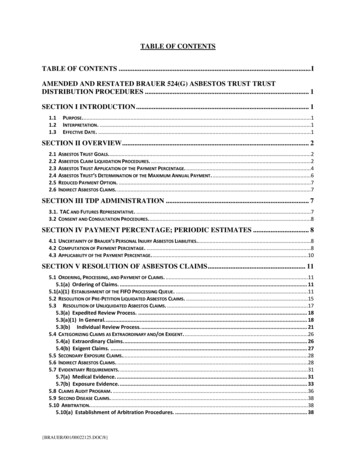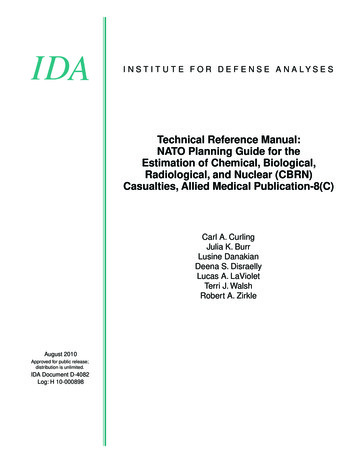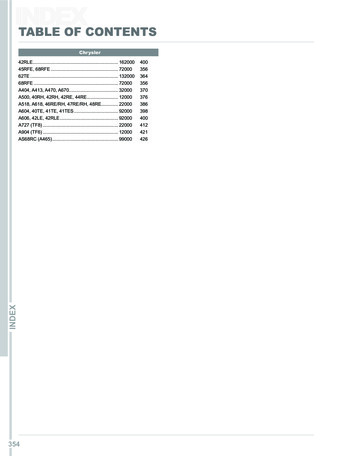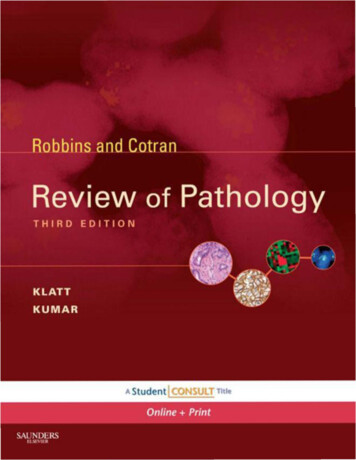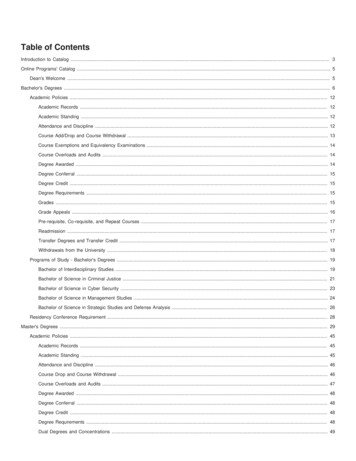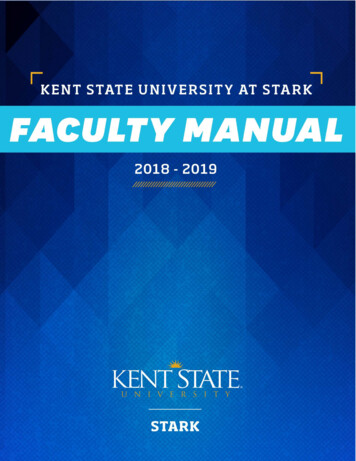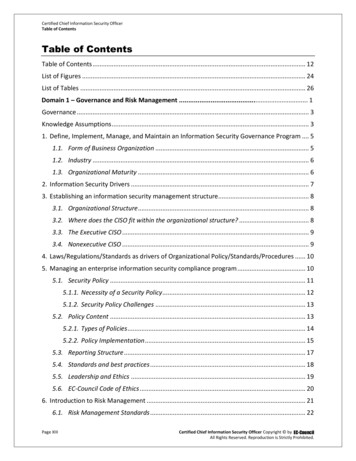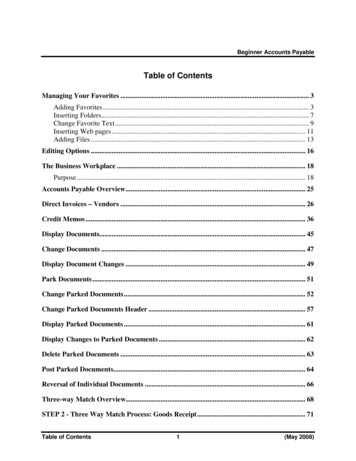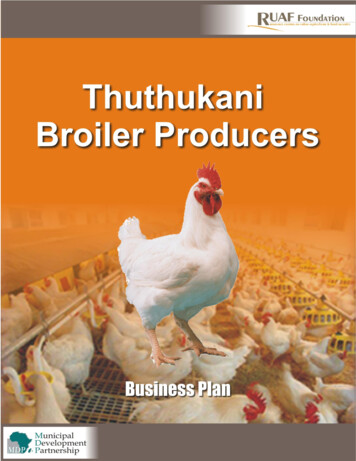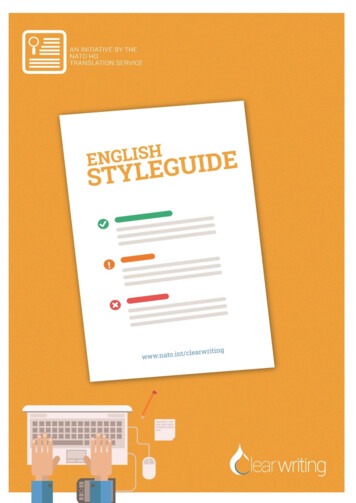
Transcription
Table of ContentsIntroductionAbbreviationsAdministrative tribunalAnd/orApostrophesCapitalizationSpecial casesCommonly misused words and phrasesCountriesCurrenciesDates and timesDecision sheetsFontsFootnotesForeign wordsForms of r-neutral icative adjectivesLettersGeneral2121From the Secretary General21From an Ambassador22From an ASG23Military ranksNumberNumeralsFractions/decimal pointCurrenciesOrganizations and 25Dashes26SpellingSuffixes -ise/-ize, etc.2202627Suffix -ment27Geographical names27
English-French divergences28TransliterationTypes of documentVerbsWord orderPrepositions2828282929Split infinitives29Annex 1: Administrative TribunalAnnex 2: Countries and currenciesCountries and currencies303434Annex 3: Military ranksMilitary ranks4848Annex 4: Transliteration of Russian into EnglishAnnex 5: Types of document in use at NATO53543
IntroductionThis Style Guide is intended for users of the English language throughout NATO. It is issued as partof the “Clear Writing” initiative launched by the IS Translation Service’s English translation team.English language translators and terminologists in the NATO HQ Translation Service are guided byofficial publications; the Concise Oxford English Dictionary is the base reference for spelling andBritish English is the norm.4
AbbreviationsThe Concise Oxford English Dictionary (COED) is the standard reference for abbreviations. Refer alsoto the Guidance for the Development and Publication of NATO Terminology, C-M(2007)0023, orsubsequent editions, for descriptions of various forms of abbreviation and how to write them.Abbreviations formed of the initial letters of words can be helpful shorthand and are often normalusage in-house, but should be used judiciously. It would be cumbersome to refer constantly to theConsultation, Command and Control Board when everyone says C3 Board, but little is gained byshortening further to C3B.Use only existing abbreviations, and do not translate a French abbreviation if there is not alreadyan English equivalent. Thus the Committee of Staff Representatives is the CRP (Comité desreprésentants du personnel).The first time an abbreviation appears in a text, its full form should be given – CNAD (Conferenceof National Armaments Directors). In principle full forms that are not proper nouns do not requireinitial capitals – ALTBMD (active layered theatre ballistic missile defence) – but in practice manydrafters put capitals on every word.English abbreviations can be made plural, as required by sense and usage, by writing an “-s” inlower case after the last letter (never preceded by an apostrophe!). But note those that are alreadypluralized: CPR (Civilian Personnel Regulations), TOR (terms of reference) and ROE (rules ofengagement). French abbreviations are not pluralized.Contractions ending in the last letter of the contracted word are written without a full stop – Mr,Mrs, Dr, Coy (military company).Other shortenings of words that do not end in the last letter are usually written with full stops –alt., Div. (referring to a military division).Standard language abbreviations are to be written as in the COED (e.g., etc., PS).5
Administrative tribunalThe proceedings of the Administrative Tribunal are published in French and English. Each versionfollows a specific format.An example of the written proceedings in English is at Annex 1.And/orUse the conjunction “and” to indicate that both or all of the items listed are included. Use theconjunction “or” when only one of the items listed is concerned. To avoid ambiguity, use theexpression “and/or” to show that one or more items in a list may be concerned.Any discrete airborne, surface or subsurface object detected by electronic,acoustic and/or visual sensorsIn this example, the object cannot be simultaneously in the air, on the surface and underthe surface, so the corresponding adjectives are separated by “or”. On the other hand, thedetection may be performed by one or any combination of the types of sensor listed, sothey are separated by “and/or”.(Note: the French equivalent of “and/or” is most often “ou”, or when greater precision isrequired: “ ou , ou les deux” or “soit soit., ou les deux”)ApostrophesPlurals: The apostrophe is never used to form plurals. (The superfluous apostrophe mistakenlyused to form a plural is often known as the “greengrocer’s apostrophe”, owing to the practice ofwriting signs such as “carrot’s 50p per lb”.)Place names: It is rare for an apostrophe to appear in place names (Bury St Edmunds, Earls Court,Golders Green), but there are some cases where it is used (King’s Cross, St John’s Wood, Land’sEnd.)Possessives: No apostrophe may be used with the pronouns hers, ours, theirs, yours, its. The last ofthese is a frequent cause of confusion; it’s is the shortened version of it is.6
CapitalizationDo not use capitals except where required by the grammar of the language, e.g. for proper nouns,nationalities or official titles.Compound terms. If capitals are required in compound names or terms, generally give all thesignificant words an initial capital, but not articles, conjunctions and prepositions ("the", "and","to", etc.).The NATO Maintenance and Supply OrganizationProper nouns and derivatives. Capitalize the first letters of proper nouns (the individual namesgiven to persons, animals or things to distinguish them from the class), including nicknames. Donot capitalize the whole surname (as is sometimes done in French).Wolfgang Amadeus MozartCarlos the Jackal (where "the Jackal" is part of the name)The Great CommunicatorTitles and ranks. Capitalize the first letter of titles and ranks pertaining to specific individuals,the King of Englandthe Belarusian, Belgian and Uzbek Representativesa briefing by Lieutenant Colonel A (named)the Chairman (of a specific committee)but not when used generically.the kings of Englandthe national representativesofficers ranking from lieutenant commander up to admiralat the start of meetings, chairmen should remind participants of securityconstraints Institutions, official bodies, commercial companies, associations, etc. Capitalize the first letter ofnames of institutions, official bodies, commercial companies, associations, etc., including NATOcommittees and groups at all levels, even if temporary.the International Court of Justicethe Ministry of Foreign Affairsthe Panel on Air Defence Weapons7
Boeing Military Airplane Companythe NATO Ramblers Clubthe Ad Hoc Working GroupMovements, religions, churches and political parties, and their adherents. Capitalize the first letterof movements, religions, churches and political parties and their adherents,the Mujaheddin (considered as a recognizable group)an Orthodox priest (of the Eastern Orthodox Church);a Marxista Republican candidate (referring to the political party)but not such words used generically.orthodox belief (i.e. conventional)republican views (i.e. not specific to a party)Treaties, agreements, legislation and official documents. Capitalize the first letter of names oftreaties, agreements, legislation and official documents or series of documents, and references tospecific major sub-divisions of documents,the Status of Forces Agreementthe Vehicle Registration ActAllied Administrative PublicationsAnnex A, Section 6but not minor sub-divisions or general descriptions.paragraph (5), 3rd lineannexes to NATO working papers and documentsRace, nationality or language. Capitalize the first letter of nouns and adjectives denoting race,nationality or language.former Soviet citizens;the rights of Aboriginals (referring to the specific Australian racial group)dialects of UzbekDates, spans of time and events. Capitalize the first letter of months, days, holidays, historicalperiods and events,8
the month of MarchWednesdayLabour Day;the Depressionthe Middle Agesthe Six-Day Warbut not seasons, centuries or decades.springthe nineteenth centurythe twentiesCountries, regions, cities, etc. Capitalize the first letter of countries, regions, cities and specificadministrative and geographic divisions and topographical features,the Near EastCentral Americathe Fulda GapParisthe Straits of Gibraltarthe Hudson River (but the river Thames)as well as points of the compass and their adjectival forms when they are parts of officialdesignations or have special connotations,Allied Forces North EuropeSouth Yorkshire (an administrative unit, not just the southern part of the county)the defence of the Westbut not when they are used generically.northern Europeto the south-westTrade names. Capitalize the first letter of trade names,Kevlar fibre9
unless they have become established as common nouns.nylon fabricsScientific terms, theories and laws. Capitalize the first letter of proper nouns and their derivatives inscientific terms, theories and laws (but not in units of measurement - see below),a Gaussian distributionOhm's lawexcept in the names of chemical elements, elementary particles and minerals.the element germaniumfermions obey Fermi-Dirac statisticsthe mineral forsteriteDo not capitalize the names of scientific theories and laws when they do not contain a propernoun.the second law of thermodynamicsthe general theory of relativityHeadings. Capitalize the first letter of a heading. If the heading contains a colon, capitalize the firstletter that follows the colon.Clinical assessment: BackgroundSpecial casesPartners. Capitalize the first letter when referring to partners in the Partnership for PeaceNATO Partner countries will be involved in the talks.but not those in any of NATO’s other partnerships (Mediterranean Dialogue, Istanbul CooperationInitiative, “Partners across the globe”).10
A meeting of the Mediterranean Dialogue partners with NATO Member countrieswill be held on Thursday.Units of measurement. Do not capitalize the first letter of units of measurement written in full, inparticular Système international (SI) units, even when they are derived from proper nouns,hertz (frequency); newtons (force)with some exceptions in temperature measurement:degrees Celsius or Fahrenheitbutkelvins (formerly degrees Kelvin)Abbreviations or symbols for units of measurement. Capitalize the first letter of abbreviations orsymbols for units of measurement derived from proper nouns, and prefixes denoting multiples ofone million units or more (mega-, giga-, tera-),V (volts); Pa (pascals); GW (gigawatts); MPa (megapascals)but do not capitalize symbols for units which are common nouns, and prefixes denoting divisionsor lesser multiples.s (seconds); cm (centimetres); mW (milliwatts); kg (kilogram)Prefix hyphenated to proper word. When a prefix is hyphenated to a proper noun or adjective,capitalize that noun or adjective, but do not capitalize the first letter of the prefix.anti-Soviet propagandanon-Newtonian fluidsContracting parties. In some legal or contractual documents, such as treaties, constructioncontracts or leases, the contracting parties may be distinguished by initial capitals, although this isnot compulsory.the Principal (the party requesting and paying for the works under a contract)11
the States PartiesInstitutions. Certain institutions may have to be capitalized depending on the context and precisemeaning:the Government (meaning a particular body of persons)the State (considered as a concept of law or political philosophy)Commonly misused words and phrases1. In the following pairs, each word or phrase has its own meaning but they are oftenconfused.car park/parking: the place where cars are parked is a car park. Parking is an activity andthere is no plural form.compare with/compare to: the first expresses contrast, the second similarity. “He is verytall compared with his brother”; “Shall I compare thee to a summer’s day?”complement/compliment: as nouns, “complement” is a thing that completes somethingand “compliment” is an expression of praise or approval. Similarly, “to complement” is tocomplete or supplement something, while “to compliment” is to express praise orapproval (pay a compliment).consist of/consist in: “consist of” means “be made up of”; “consist in” means “have as itsessential qualities”.“The group consisted of five string players and two singers.”“Moral government consists in rewarding the righteous and punishing thewicked.”continual/continuous: “continual” means “regularly recurring”, while “continuous” means“ongoing” or “uninterrupted”.convince/persuade: these are often interchangeable (“I convinced him that it was true” and“I persuaded him that it was true” are both acceptable), but “convince” may not befollowed by an infinitive (“I persuaded him to go” is correct, but “I convinced him to go” iswrong).12
discreet/discrete: “discreet” means “showing discernment” or “unobtrusive”; “discrete”means “separate” or “distinct”.disinterested/uninterested: a disinterested person is one who is impartial or free frompersonal interest; an uninterested person is indifferent.due to/owing to: the thing that is “due to” must be a noun, while “owing to” refers to aclause. For example, “the delay was due to snow” but “the train was late owing to snow”.effect/affect: usually, “effect” is a noun and “affect” is a verb. For example, “the decisionwill have a significant effect on relations” or “the decision will affect relationssignificantly”. It is possible to effect (bring about) a change, and “affect” exists as a nounmeaning a disposition or a mood, but these are used less commonly.enormity/enormousness: “enormity” denotes outrageousness or wickedness, as in “theenormity of his crime”. “Enormousness” merely refers to size.imply/infer: the speaker implies (makes an implication), the listener infers (draws aninference).if/in case: these are used differently depending on whether something actually happens oris expected to happen. “John took an umbrella if it rain
This Style Guide is intended for users of the English language throughout NATO. It is issued as part of the lear Writing _ initiative launched by the IS Translation Service [s English translation team. English language translators and terminologists in the NATO HQ Translation Service are guided by official publications; the Concise Oxford English Dictionary is the base reference for spelling .
